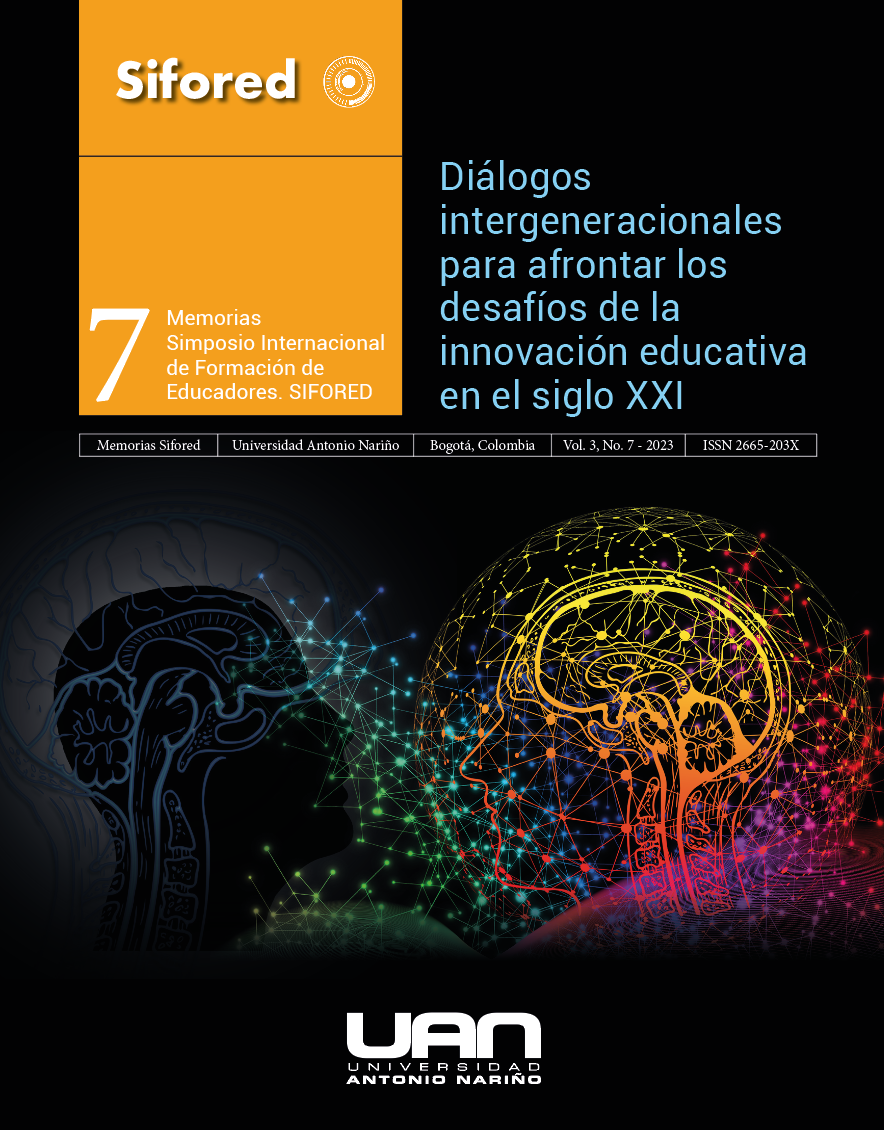Aplicaciones del marco DigCompEdu en la formación de docentes de secundaria. Una revisión sistemática de la literatura
Palabras clave:
formación de docentes, enseñanza secundaria, educación tecnológica, investigación educativa, revisión sistemáticaResumen
El diseño de propuestas curriculares de formación en competencias digitales docentes (CDD) requiere de actualización constante desde referentes globales que las aborden de forma integral. Esta revisión sistemática de literatura tiene como objetivo identificar la influencia del marco de referencia DigCompEdu en el diseño de propuestas de formación y evaluación diagnóstica de las competencias digitales de docentes de secundaria entre el 2017 y octubre de 2022. Se siguieron los parámetros de la metodología PRISMA, desde una base de datos producto del análisis en SCOPUS de artículos finalizados y publicados en inglés, portugués y español. La muestra final (n=29), fue analizada en profundidad con Atlas.ti. Se identificó que el marco DigCompEdu de la Comisión Europea es el referente principal en este tipo de formación, presencial o virtual. Además, se destaca que España y Portugal lideran el diseño y aplicación de investigación diagnóstica ad hoc o validada previamente con base en este marco, y que la tendencia apunta a desarrollar la competencia docente de forma integral con las seis áreas de DigCompEdu, con canales de comunicación permanente, presentes no solo durante la formación.
Descargas
Citas
Cabero-Almenara, J., Romero-Tena, R., & Palacios-Rodríguez, A. (2020). Evaluation of teacher digital competence frameworks through expert judgment: The use of the expert competence coefficient. Journal of New Approaches in Educational Research, 9(2), 275–283. https://doi.org/10.7821/naer.2020.7.578
Cantabrana, J. L. L., Rodríguez, M. U., & Cervera, M. G. (2019). Assessing teacher digital competence: The construction of an instrument for measuring the knowledge of pre-service teachers. Journal of New Approaches in Educational Research, 8(1), 73–78. https://doi.org/10.7821/naer.2019.1.370
Çebi, A., Bahçekapılı Özdemir, T., Reisoğlu, İ., & Çolak, C. (2022). From digital competences to technology integration: Re-formation of pre-service teachers’ knowledge and understanding. International Journal of Educational Research, 113. https://doi.org/10.1016/j.ijer.2022.101965
Choe, Y., Lee, J., & Lee, G. (2022). Exploring Values via the Innovative Application of Social Media with Parks Amid COVID-19: A Qualitative Content Analysis of Text and Images Using ATLAS.ti. Sustainability (Switzerland), 14(20). https://doi.org/10.3390/su142013026
Dias-Trindade, S., & Ferreira, A. G. (2020). Digital teaching skills: Digcompedu checkin as an evolution process from literacy to digital fluency. Icono14, 18(2), 162–187. https://doi.org/10.7195/RI14.V18I2.1519
Gallego-Arrufat, M.-J., Torres-Hernández, N., & Pessoa, T. (2019). Competence of future teachers in the digital security area. Comunicar, 27(61), 53–62. https://doi.org/10.3916/C61-2019-05
Gordillo, A., Barra, E., Garaizar, P., & López-Pernas, S. (2021). Use of a Simulated Social Network as an Educational Tool to Enhance Teacher Digital Competence. Revista Iberoamericana de Tecnologías Del Aprendizaje, 16(1), 107–114. https://doi.org/10.1109/RITA.2021.3052686
Lucas, M., Dorotea, N., & Piedade, J. (2021a). Developing Teachers’ Digital Competence: Results from a Pilot in Portugal. Revista Iberoamericana de Tecnologías Del Aprendizaje, 16(1), 84–92. https://doi.org/10.1109/RITA.2021.3052654 Lucas, M., Bem-Haja, P., Siddiq, F., Moreira, A., & Redecker, C. (2021b). The relation between in-service teachers' digital competence and personal and contextual factors: What matters most? Computers and Education, 160 https://doi:10.1016/j.compedu.2020.104052
Marta-Lazo, C., Frau-Meigs, D., & Osuna-Acedo, S. (2019). A collaborative digital pedagogy experience in the tMOOC “Step by Step.” Australasian Journal of Educational Technology, 35(5), 111–127. https://doi.org/10.14742/ajet.4215 Martínez-Pérez, S., Cabero-Almenara, J., Barroso-Osuna, J., & Palacios-Rodríguez, A. (2022). T-MOOC for Initial Teacher Training in Digital Competences: Technology and Educational Innovation. Frontiers in Education, 7.
https://doi.org/10.3389/feduc.2022.846998
MEN [Ministerio de Educación Nacional de Colombia] (2013). Competencias TIC para el Desarrollo Profesional Docente. https://www.mineducacion.gov.co/1759/articles-339097_archivo_pdf_competencias_tic.pdf
Page, M. J., McKenzie, J. E., Bossuyt, P. M., Boutron, I., Hoffmann, T. C., Mulrow, C. D., Shamseer, L., Tetzlaff, J. M., Akl, E. A., Brennan, S. E., Whiting, P., & Moher, D. (2022). The PRISMA 2020 statement: an updated guideline for reporting systematic reviews. American Journal of Public Health, 46. https://doi.org/10.26633/RPSP.2022.112
Paré, G., Trudel, M.-C., Jaana, M., & Kitsiou, S. (2015). Synthesizing information systems knowledge: A typology of literature reviews. Information Management, 52(2), 183–199. https://doi.org/10.1016/J.IM.2014.08.008
Reisoğlu, İ., & Çebi, A. (2020). How can the digital competences of pre-service teachers be developed? Examining a case study through the lens of DigComp and DigCompEdu. Computers and Education, 156.
https://doi.org/10.1016/j.compedu.2020.103940
Rodríguez, M. U., Cantabrana, J. L. L., & Cervera, M. G. (2021). Validation of a tool for self-evaluating teacher digital competence. Educación XX1, 24(1), 353–373. https://doi.org/10.5944/educXX1.27080
Rodríguez, N. C., Lorenzo-Rial, M.-A., & Rodríguez, U. P. (2022). Digital competence of teachers in terms of content creation: self-perception of teachers in educational scientific training in Galicia (Spain). Educação e Pesquisa, 48. https://doi.org/10.1590/S1678-4634202248243510
Romero-García, C., Buzón-García, O., & de Paz-Lugo, P. (2020b). Improving future teachers’ digital competence using active methodologies. Sustainability (Switzerland), 12(18). https://doi.org/10.3390/SU12187798
Cattaneo, A. A. P., Antonietti, C., & Rauseo, M. (2022). How digitalised are vocational teachers? Assessing digital competence in vocational education and looking at its underlying factors. Computers and Education, 176.
Descargas
Publicado
-
Resumen374
-
PDF114
Cómo citar
Número
Sección
Licencia

Esta obra está bajo una licencia internacional Creative Commons Atribución-NoComercial-CompartirIgual 4.0.


 Portal de Ciencia Abierta
Portal de Ciencia Abierta